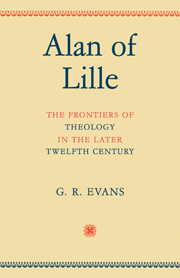Summary
Stephen Langton, later archbishop of Canterbury, was outstanding among the masters of theology at Paris at the turn of the century. His inaugural lecture survives, and it is evident that from the very beginning of his career he set a standard of thorough competence, in the mainstream of contemporary Biblical scholarship. He takes as his text Exodus 12.34, 39 and 16. The Children of Israel set out from Egypt with sacks of meal on their backs. With these they made bread in the glowing embers of the fire when they camped for the night; then, in the desert, they received heavenly manna; later still, when they had arrived in the Promised Land, they ate the fruit of that land. Here Stephen undoubtedly has a good story, full of narrative interest, and likely to whet the listener's desire to know what these three kinds of food represent in his own life, and to understand what are the individual grains which fill the sacks. Stephen does not disappoint them of answers. ‘We, like true Children of Israel, before we come to the land of heavenly promise and eat the fruit of that land, ought to eat a twofold spiritual food in the present, taking grain from Egypt and tasting the heavenly manna.’ We may learn from studying the ten plagues of Egypt what ‘grains’ are to make up the meal. He ventures a scholarly joke: ‘let the deceitfulness (fallacia) of the world be brought to nothing, for a sophism perishes when it is detected’. No point of exposition is neglected: ‘Now let us look at’; ‘Now let us consider’, says Stephen.
- Type
- Chapter
- Information
- Alan of LilleThe Frontiers of Theology in the Later Twelfth Century, pp. 166 - 171Publisher: Cambridge University PressPrint publication year: 1983



